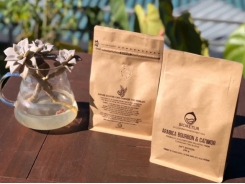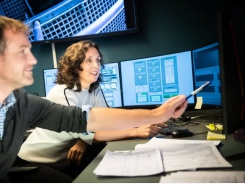Fish-free feed breakthrough

Researchers have developed a cost-effective “fish-free” feed for carnivorous marine finfish, in which fishmeal and fish oil have been replaced by poultry meal and algal oil respectively.
The trials took place at Ocean Era's kampachi farm, off Hawaii. Photo: Doug Perrine / SeaPics
During the three-month trial funded by a Saltonstall-Kennedy grant from the National Oceanic and Atmospheric Administration (NOAA), 480 juvenile kampachi (Seriola rivoliana) were fed one of four diets. Two of the diets contained no fishmeal, and one of these also contained no fish oil. Fishmeal replacement relied primarily on poultry meal, from up-cycled poultry trimmings. Fish oil replacement was achieved using Veramaris natural marine algal oil, which contains high levels of two critical omega-3 fatty acids, DHA and EPA. A fishmeal and fish oil diet was used as a control, together with an additional commercial control diet. The fish were stocked into sixteen tanks for the comparative grow-out trial.
“This is the first time – to our knowledge – that fishmeal and fish oil have been totally eliminated from the diet of a marine carnivorous fish, with no deleterious consequences,” said Neil Anthony Sims, CEO of the Hawaii-based Ocean Era, where the trial was conducted. “Kampachi are a fast-growing, sashimi-grade fish, so this a significant breakthrough for the sustainability and scalability of marine fish farming.”
Aquaculture, the world’s fastest growing food sector, consumes more than 70 percent of the world’s fish oil and fishmeal, which are derived from forage fish like sardines, anchovies and menhaden. Roughly 20 percent of the global wild catch, or 18 million tonnes of fish each year, are converted into fishmeal and fish oil for use in animal feed.
The fish that were fed the zero fishmeal / zero fish-oil diet performed as well as the fish fed with the fishmeal and fish-oil diet. Performance was evaluated in terms of growth, feed conversion ratio (FCR), fillet yield and survival. FCR is the ratio of the amount of feed it takes to grow one kilogram of fish.
The fish fed the zero fishmeal / zero fish-oil diet also had a more desirable taste compared to the fish fed the commercially available control diet.
“The results clearly show that algal oil can replace fish oil 100 percent without any reduction in growth of this marine fish,” said Rick Barrows, a fish nutrition expert with Aquatic Feed Technologies and co-principal investigator of the study.
The feed formulations used in this trial are available as open source formulae through the HYPERLINK "http://link.mediaoutreach.meltwater.com/ls/click?upn=zbp5juR-2BQhHisx46uUFmw5nFZ6IZpIZ4piu48mJlNDY-3DxOxT_8QJkuvfh2kybzyil6ZsKtLwlImm4VA-2B0V41EpnTIEFTL0i-2BhA2tSN3K4wqBGzCbEXIFe-2B4rCUCSlDGcMJyoxwKc3Krvqd-2F-2Bo14MPJzRhoo6j16ngV5A0uqwPY-2FEhGRyTCi3olhygsWivgE8-2FyCOgBYTbRuzaDTQ4cjODGtaJqbsiCbtm4SGU7Hx6hwOMYA4H5y5D4FRtCRRbJpJ9EcOqfxj3BFrXCfIG5kdmjur4-2BjvADwda6TJUSO3lL7Xo5kzRl5m9pHsfo10-2FJrAP3J-2BD1lhFQsbNApjffvfpmzK6Nk3WKxIjC6NQMcWbK72q-2FUP0ROpCUqgc03v0R6A6-2FyLWGlDtmrBuxOFBO-2B4IY-2BeVlUalrEmV5x-2Fxo-2BNMq9l04SFVNTcwpUXltppZkMHWCbqXYg-3D-3D"F3 Feed Innovation Network (F3 FIN) for anyone working to replace wild-caught fish ingredients in animal feed. F3 FIN encourages sustainable innovations in fish-free aquaculture feed ingredients by sharing experimental protocols, testing facilities and ingredient providers.
Algae oils have been shown to contain twice the amount of EPA and DHA omega-3 fatty acids as fish oil, both of which are important for maintaining fish health and imparting heart and brain health benefits to humans.
“Development of diets that use these upcycled ingredients and microalgal oils is critical to the long-term scalability of marine fish culture, and therefore to our ability to sustainably feed a planet of nine billion people with heart-healthy seafood,” said Sims.
The project, titled “Developing cost-effective fishmeal-free and fish oil-minimized diets for high market value US marine fish aquaculture,” was funded through NOAA’s Saltonstall-Kennedy Grant Program (NA18NMF4270208). The United States Department of Agriculture’s (USDA) Agricultural Research Service provided feed milling support for the trial. Anthropocene Institute and Ka'upulehu fishponds were collaborating partners on the NOAA grant.
Related news
Tools

Phối trộn thức ăn chăn nuôi

Pha dung dịch thủy canh

Định mức cho tôm ăn

Phối trộn phân bón NPK

Xác định tỷ lệ tôm sống

Chuyển đổi đơn vị phân bón

Xác định công suất sục khí

Chuyển đổi đơn vị tôm

Tính diện tích nhà kính

Tính thể tích ao




 A fresh approach to probiotics for saltwater aquaculture
A fresh approach to probiotics for saltwater aquaculture  Training Ghana’s tilapia farmers
Training Ghana’s tilapia farmers